Our Library
Explore our publications, from research papers and series to educational materials, covering all aspects of conflict transformation and peace promotion.
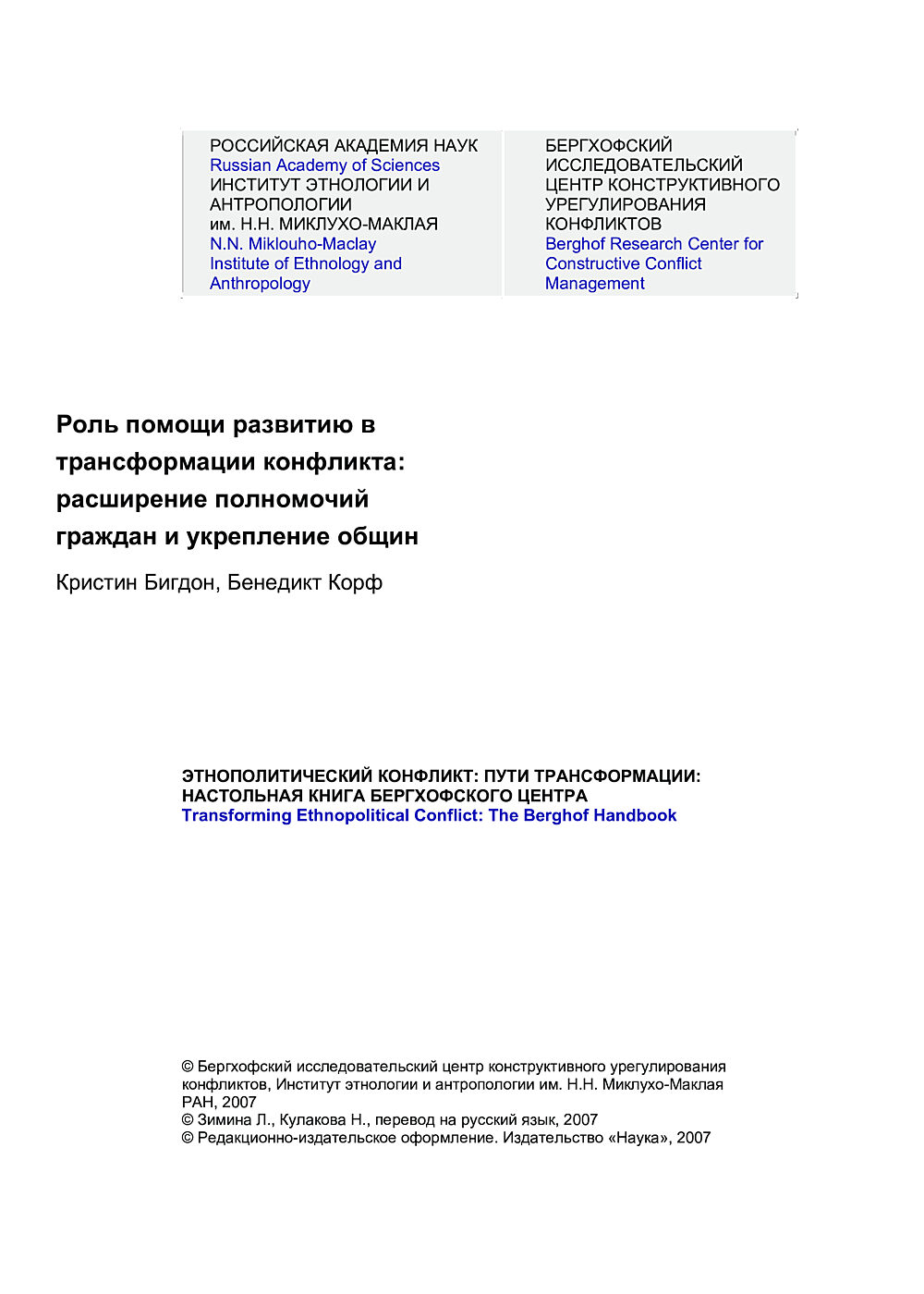
Роль помощи развитию в трансформации конфликта: расширение полномочий граждан и укрепление общинHandbook Article
[Аннотация машинный перевод] Подчеркивает роль помощи в целях развития для структурных аспектов миростроительства. Исследуя взаимосвязь между участием, расширением прав и возможностей и трансформацией конфликта, авторы критически обсуждают потенциал общих подходов, основанных на участии, на уровне сообщества и их влияние на трансформацию конфликта на местном уровне. (переработано для печатного издания 2004 г.).
- Year2007
- Author(s)Christine Bigdon, Benedikt Korf
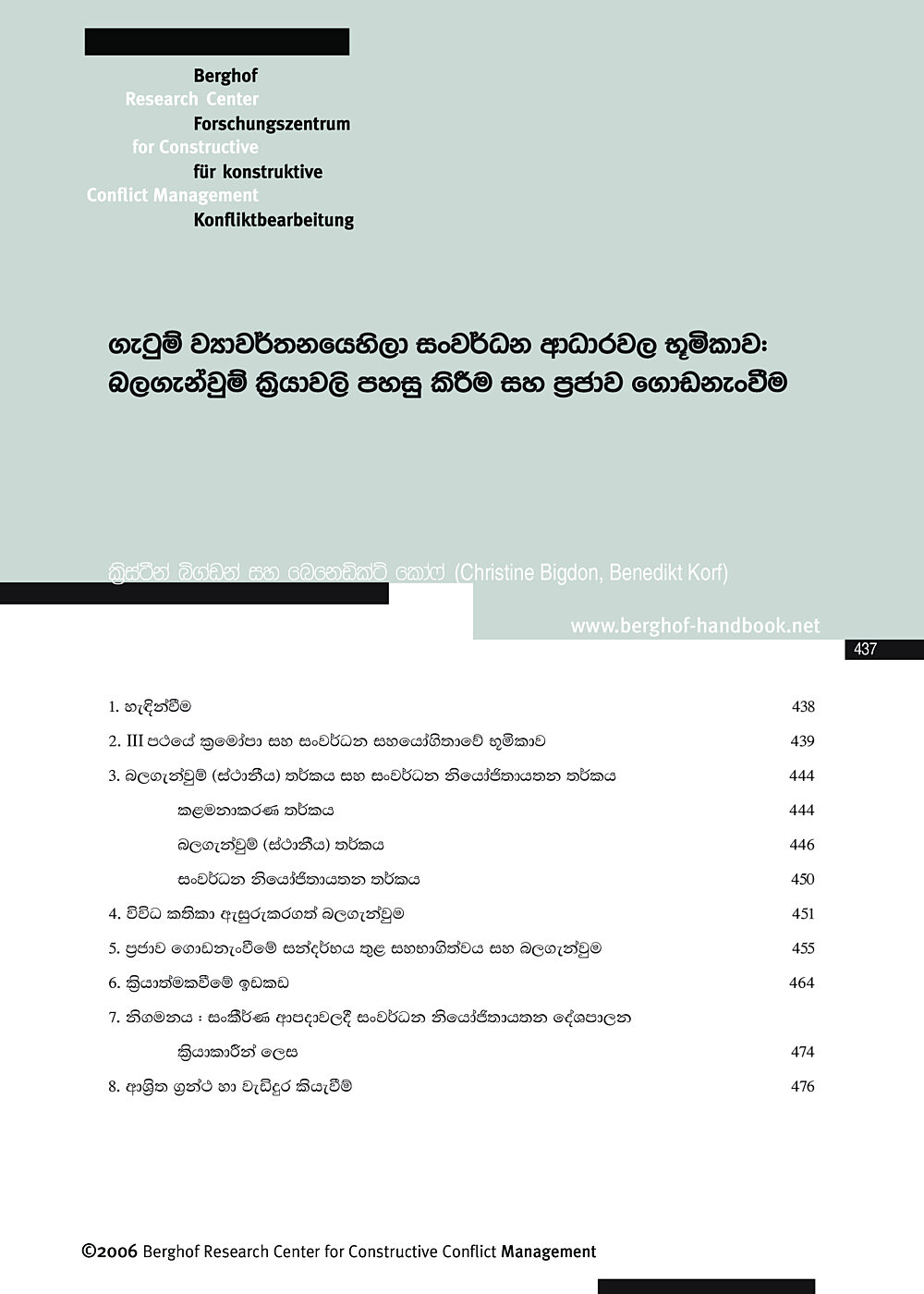
ගැටුම් ව්යාවර්තනයෙහිලා සංවර්ධන ආධාරවල භූමිකාව: බලගැන්වුම් ක්රියාවලි පහසු කිරීම සහ ප්රජාව ගොඩනැංවීමHandbook Article
[වියුක්ත යන්ත්ර පරිවර්තනය] සාමය ගොඩනැගීමේ ව්යුහාත්මක අංශ සඳහා සංවර්ධන ආධාරවල කාර්යභාරය ඉස්මතු කරයි. සහභාගීත්වය, සවිබල ගැන්වීම සහ ගැටුම් පරිවර්තනය අතර ඇති සම්බන්ධතාවය ගවේෂණය කරමින් කතුවරුන් ප්රජා මට්ටමින් පොදු සහභාගීත්ව ප්රවේශයන්හි විභවය සහ ප්රාදේශීය මට්ටමින් ගැටුම් පරිවර්තනය සඳහා ඔවුන් දක්වන බලපෑම විවේචනාත්මකව සාකච්ඡා කරයි. (2004 මුද්රණ සංස්කරණය සඳහා සංශෝධනය කරන ලදි).
- Year2007
- Author(s)Christine Bigdon, Benedikt Korf
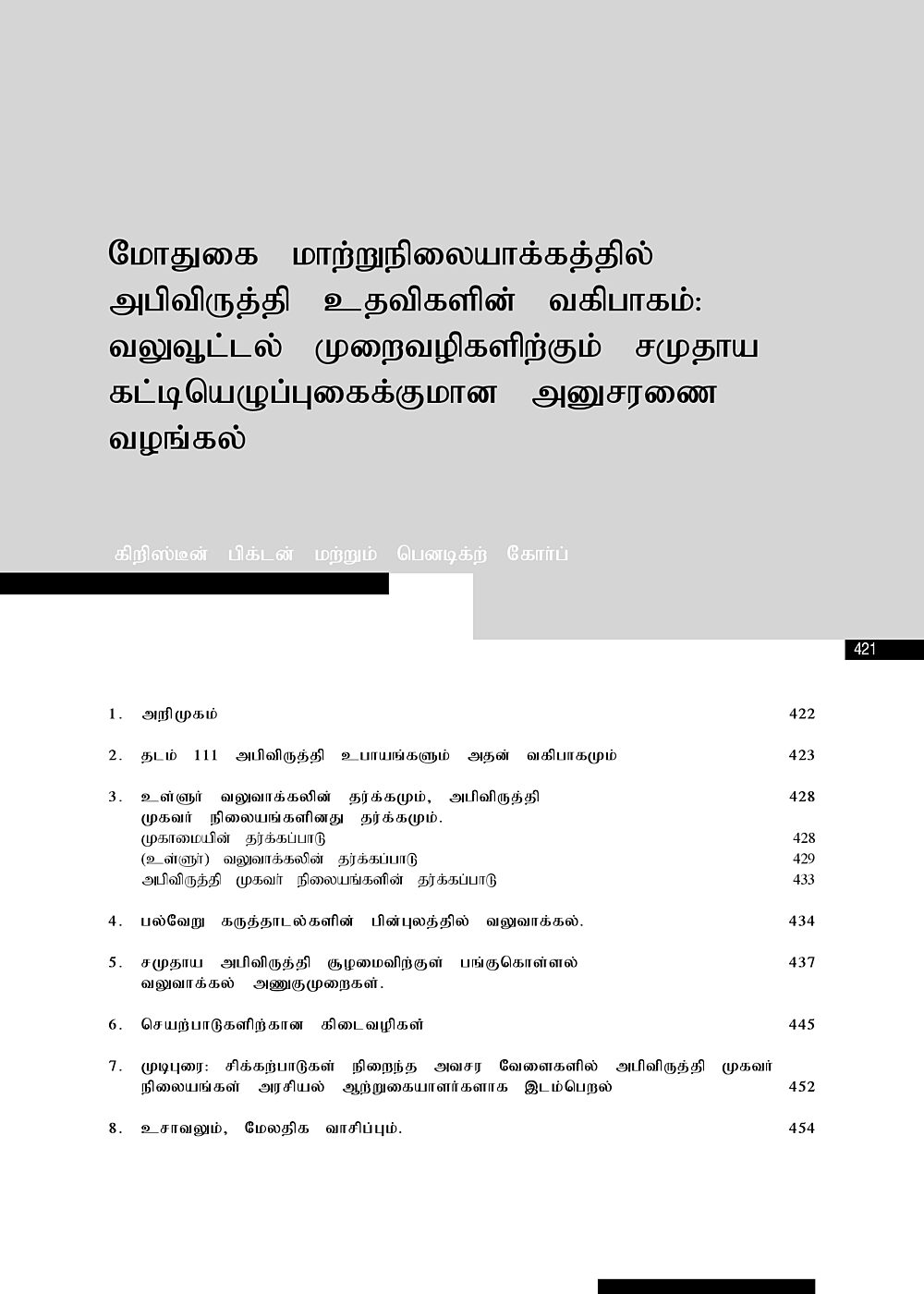
மோதுகை மாற்றுநிலையாக்கத்தில் அபிவிருத்தி உதவிகளின் வகிபாகம்: வலுவூட்டல் முறைவழிகளிற்கும் சமுதாய கட்டியெழுப்புகைக்குமான அனுசரணை வழங்கல்Handbook Article
[சுருக்கம் இயந்திரம்-மொழிபெயர்க்கப்பட்டுள்ளது] அமைதி கட்டமைப்பின் கட்டமைப்பு அம்சங்களுக்கான மேம்பாட்டு உதவியின் பங்கை எடுத்துக்காட்டுகிறது. பங்கேற்பு, அதிகாரமளித்தல் மற்றும் மோதல் உருமாற்றம் ஆகியவற்றுக்கு இடையிலான உறவை ஆராய்ந்து, ஆசிரியர்கள் சமூக மட்டத்தில் பொதுவான பங்கேற்பு அணுகுமுறைகளின் திறனையும் உள்ளூர் மட்டத்தில் மோதல் மாற்றத்திற்கான அவற்றின் தாக்கத்தையும் விமர்சன ரீதியாக விவாதிக்கின்றனர். (2004 அச்சு பதிப்பிற்காக திருத்தப்பட்டது).
- Year2007
- Author(s)Christine Bigdon, Benedikt Korf
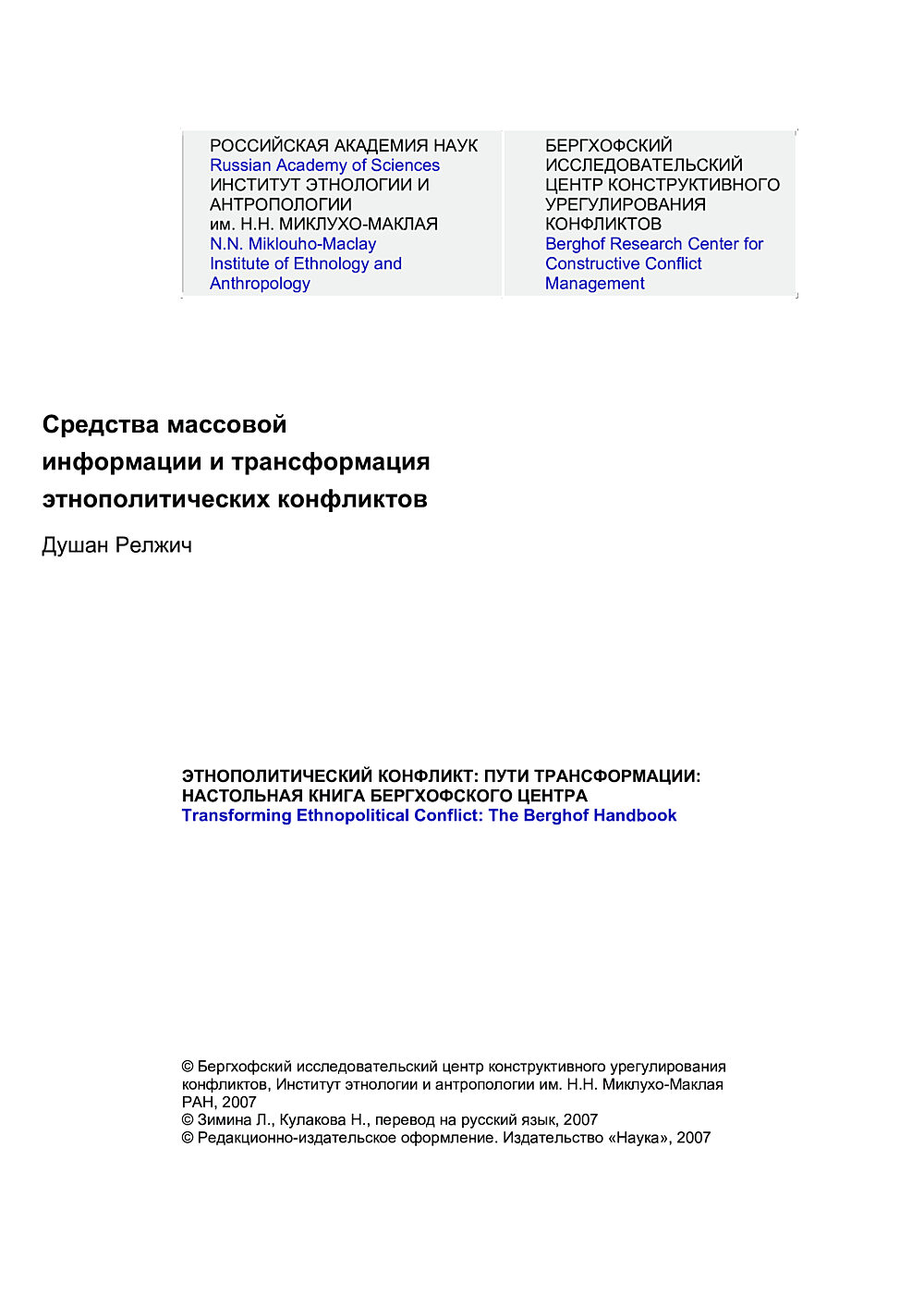
Средства массовой информации и трансформация этнополитических конфликтовHandbook Article
[Аннотация машинный перевод] Обсуждаются возможности и ограничения трансформации конфликтов посредством молодежной и образовательной работы. Автор исследует теоретические и концептуальные подходы, каталогизирует ключевые методологии, принципы обучения и желаемые результаты как для формального, так и для неформального образования. Она также решает текущие проблемы.
- Year2007
- Author(s)Dusan Reljic
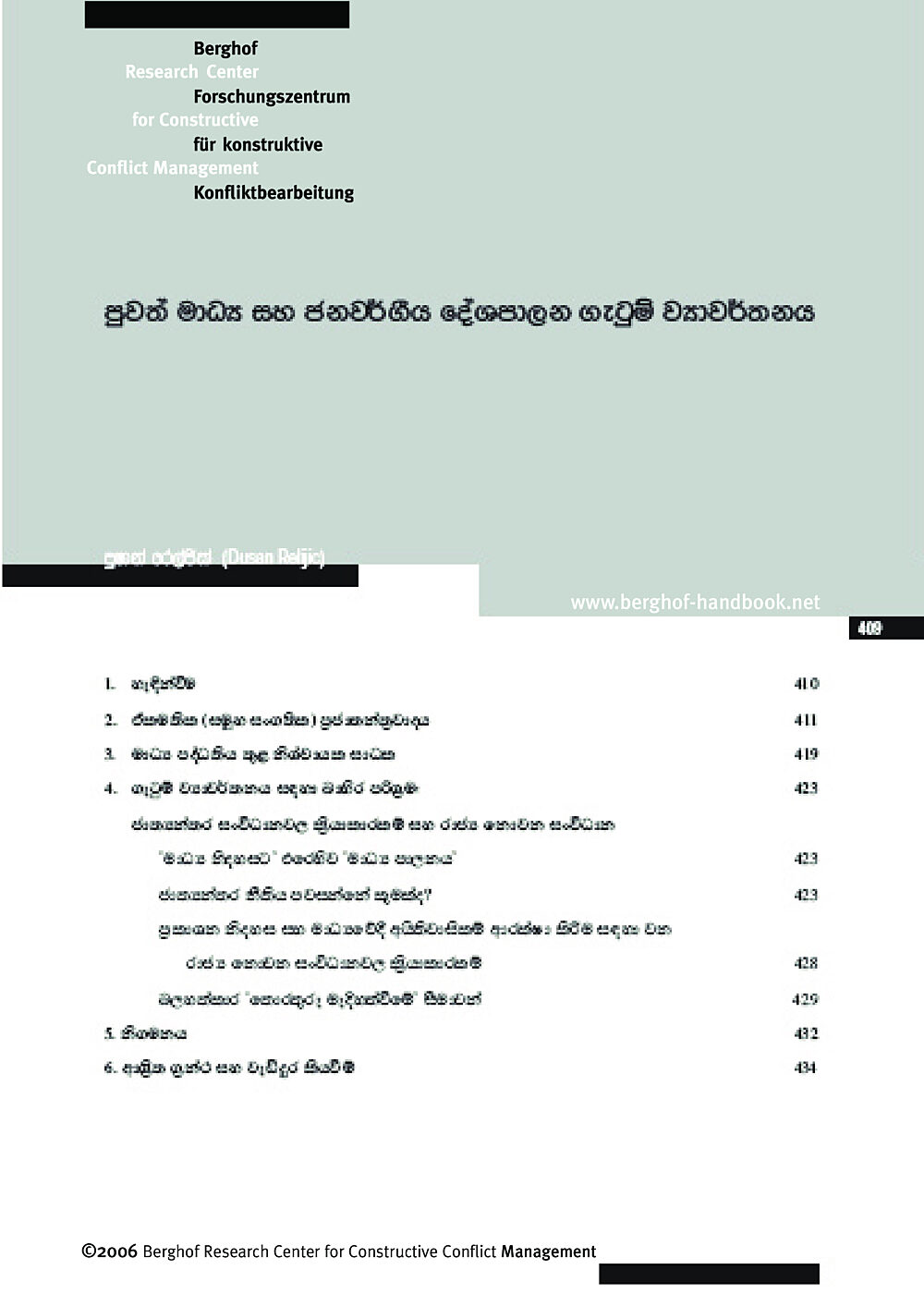
පුවත් මාධ්ය සහ ජනවාර්ගීය දේශපාලන ගැටුම් ව්යාවර්තනයHandbook Article
[වියුක්ත යන්ත්ර-පරිවර්තනය] සාමය පෝෂණය වන අයුරින් ජනවාර්ගික දේශපාලනික ගැටුම් වාර්තා කිරීම සඳහා යෝජනා ඉදිරිපත් කරයි. කතුවරයා ජනමාධ්යයේ බලපෑම පැහැදිලි කිරීම සඳහා මූලික ආකෘතියක් ඉදිරිපත් කරයි, එසේම රාජ්ය නොවන සංවිධාන ක්රියාකාරකම් සහ යුරෝපීය මට්ටමින් ප්රතිසංස්කරණ ප්රයත්න සඳහා යෝජනාවක් සාකච්ඡා කරයි. (2004 මුද්රණ සංස්කරණය සඳහා සංශෝධනය කරන ලදි)
- Year2007
- Author(s)Dusan Reljic
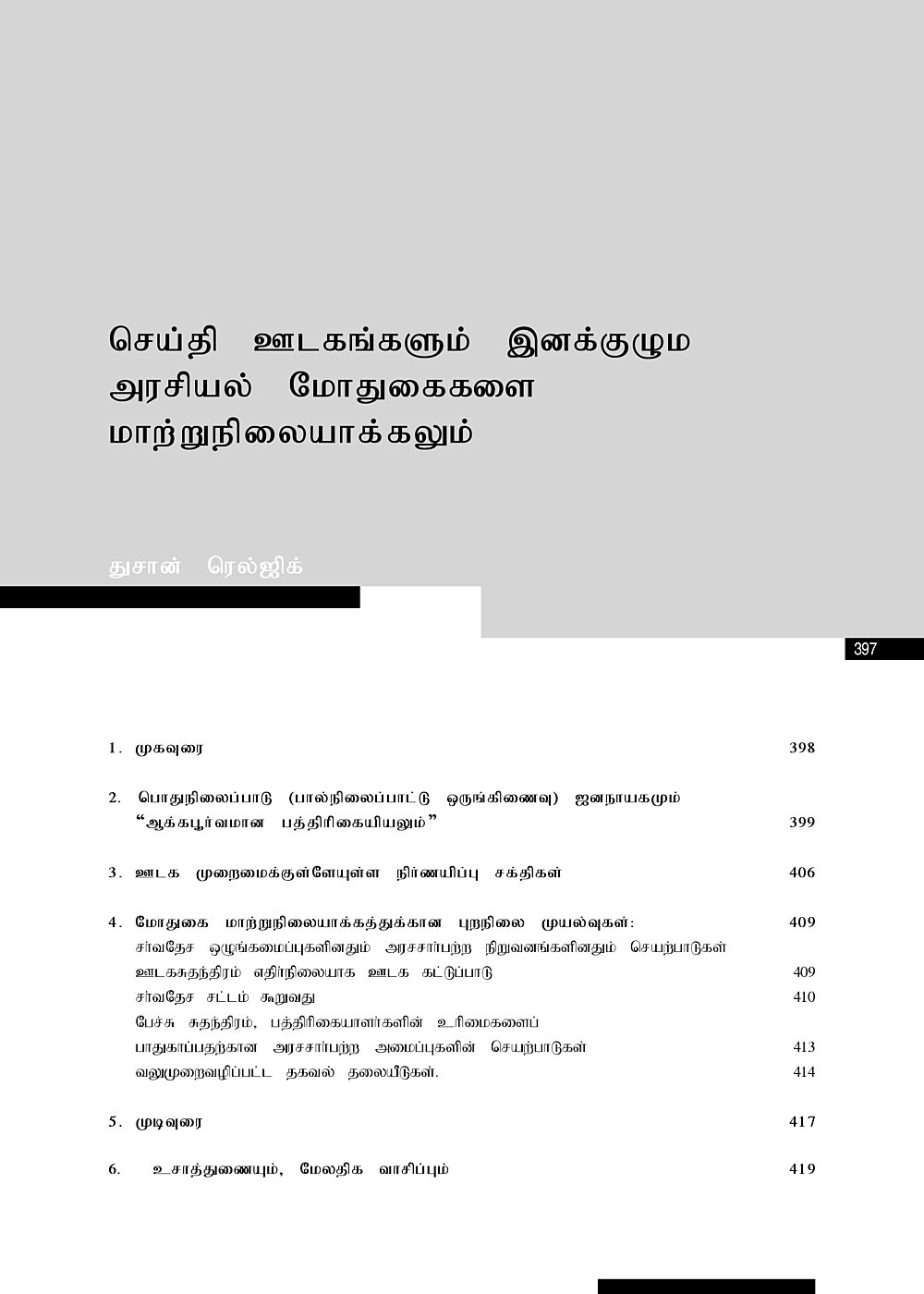
செய்தி ஊடகங்களும், இனக்குழும அரசியல் மோதுகைகளை மாற்றுநிலையாக்கலும்Handbook Article
[சுருக்கம் இயந்திரம் மொழிபெயர்க்கப்பட்டுள்ளது] சமாதானத்தை வளர்க்கும் வகையில் இன அரசியல் மோதல்களைப் புகாரளிப்பதற்கான திட்டங்களை முன்வைக்கிறது. ஊடகங்களின் தாக்கத்தை விளக்குவதற்கும், தன்னார்வ தொண்டு நிறுவனங்கள் மற்றும் ஐரோப்பிய மட்டத்தில் சீர்திருத்த முயற்சிகளுக்கான முன்மொழிவு பற்றியும் விவாதிக்க ஆசிரியர் ஒரு அடிப்படை மாதிரியை வழங்குகிறார். (2004 அச்சு பதிப்பிற்காக திருத்தப்பட்டது)
- Year2007
- Author(s)Dusan Reljic
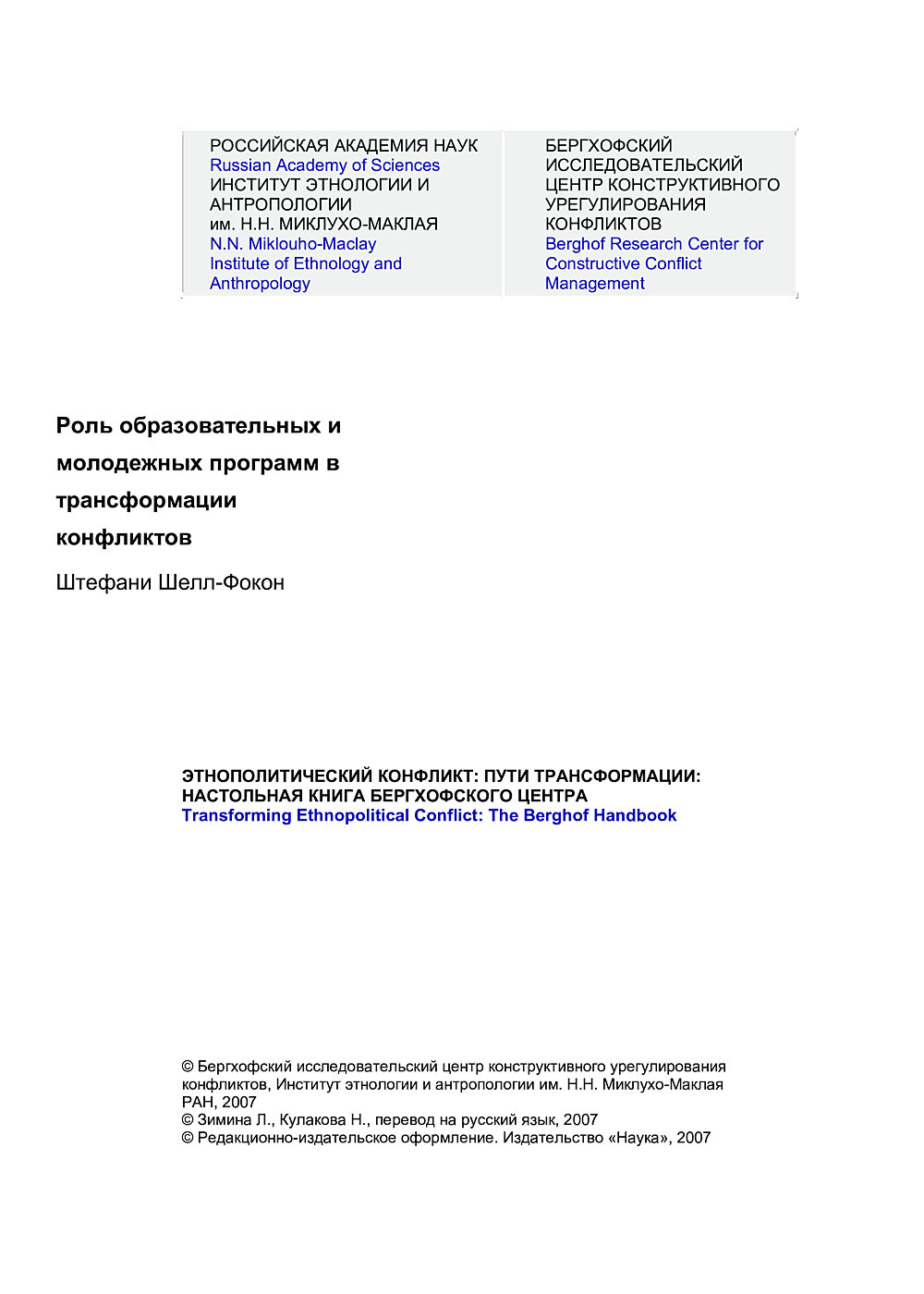
Роль образовательных и молодежных программ в трансформации конфликтовHandbook Article
[Аннотация машинный перевод] Обсуждаются возможности и ограничения трансформации конфликтов посредством молодежной и образовательной работы. Автор исследует теоретические и концептуальные подходы, каталогизирует ключевые методологии, принципы обучения и желаемые результаты как для формального, так и для неформального образования. Она также решает текущие проблемы.
- Year2007
- Author(s)Stephanie Schell-Faucon
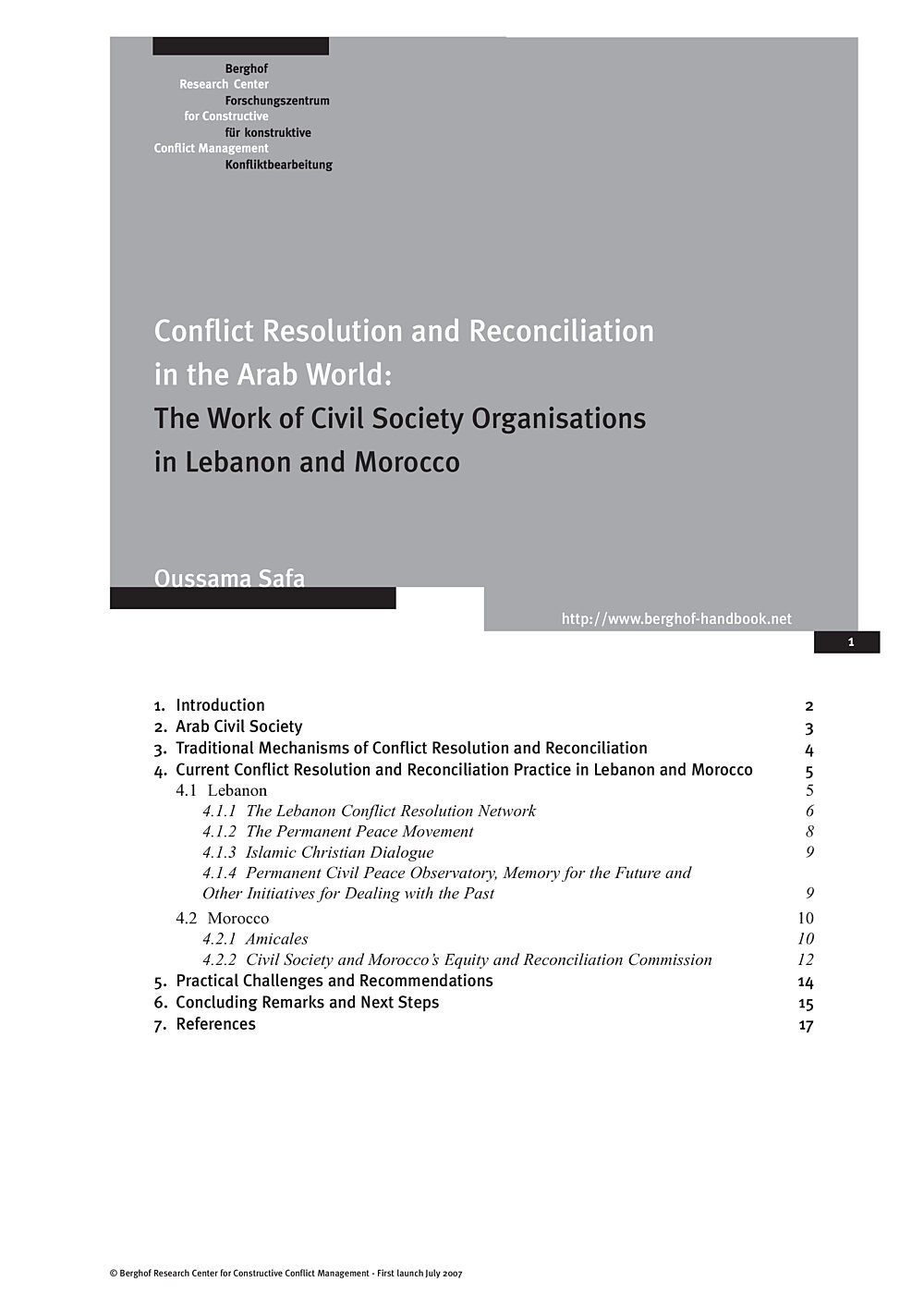
Conflict Resolution and Reconciliation in the Arab World: The Work of Civil Society Organisations in Lebanon and MoroccoHandbook Article
- Year2007
- Author(s)Oussama Safa
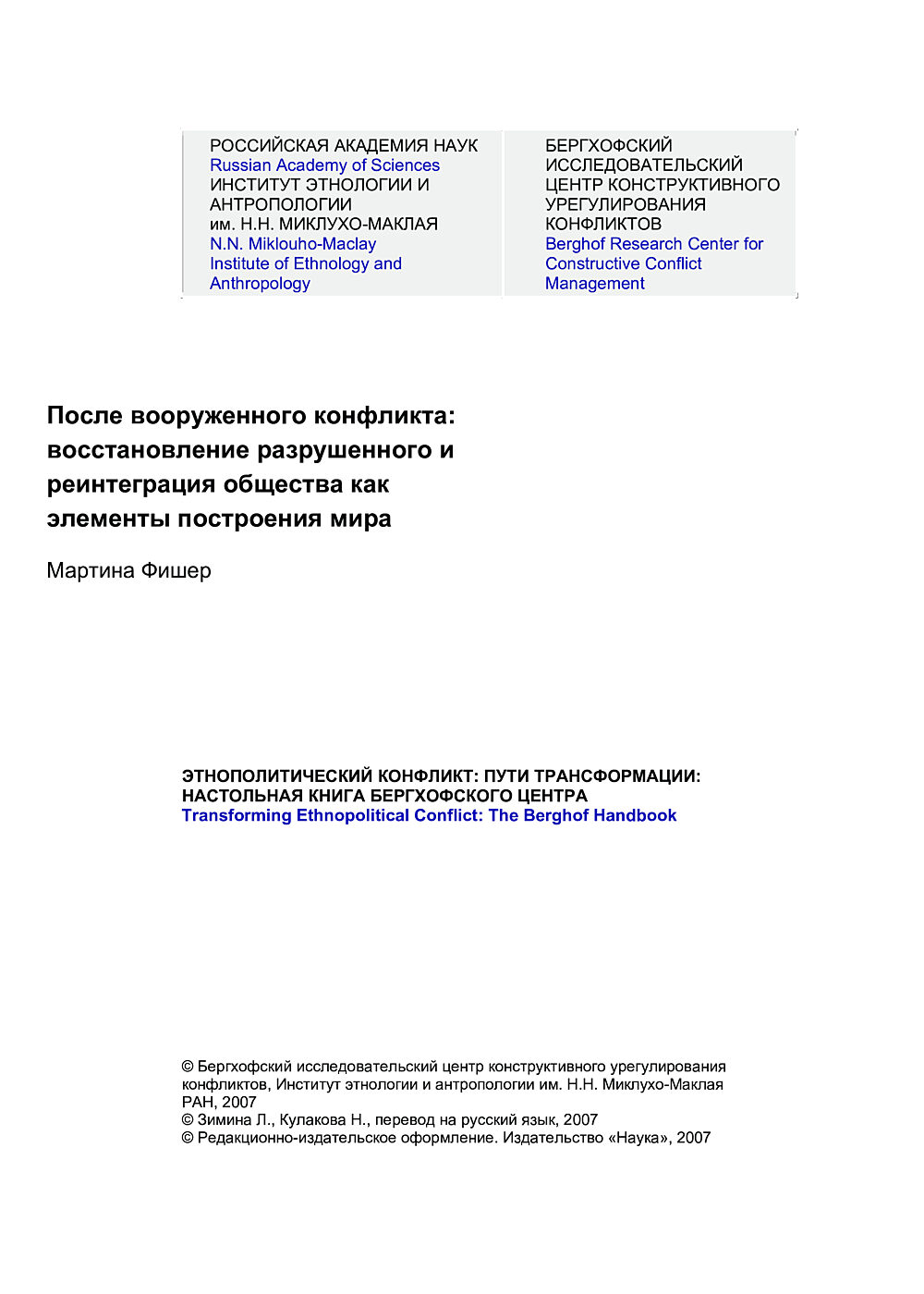
После вооруженного конфликта: восстановление разрушенного и реинтеграция общества как элементы построениHandbook Article
[Аннотация машинный перевод] Утверждает, что (ре) интеграция беженцев и перемещенных лиц является одной из основных проблем и предварительным условием трансформации конфликта. В этом процессе необходимы совместные усилия, которые сочетают в себе развитие, экономические перспективы и расширение прав и возможностей местных субъектов для участия гражданского общества, воспитания в духе мира и социальной работы. Уроки Балкан показывают, что координация действий имеет решающее значение. (переработано для печатного издания 2004 г.)
- Year2007
- Author(s)Martina Fischer
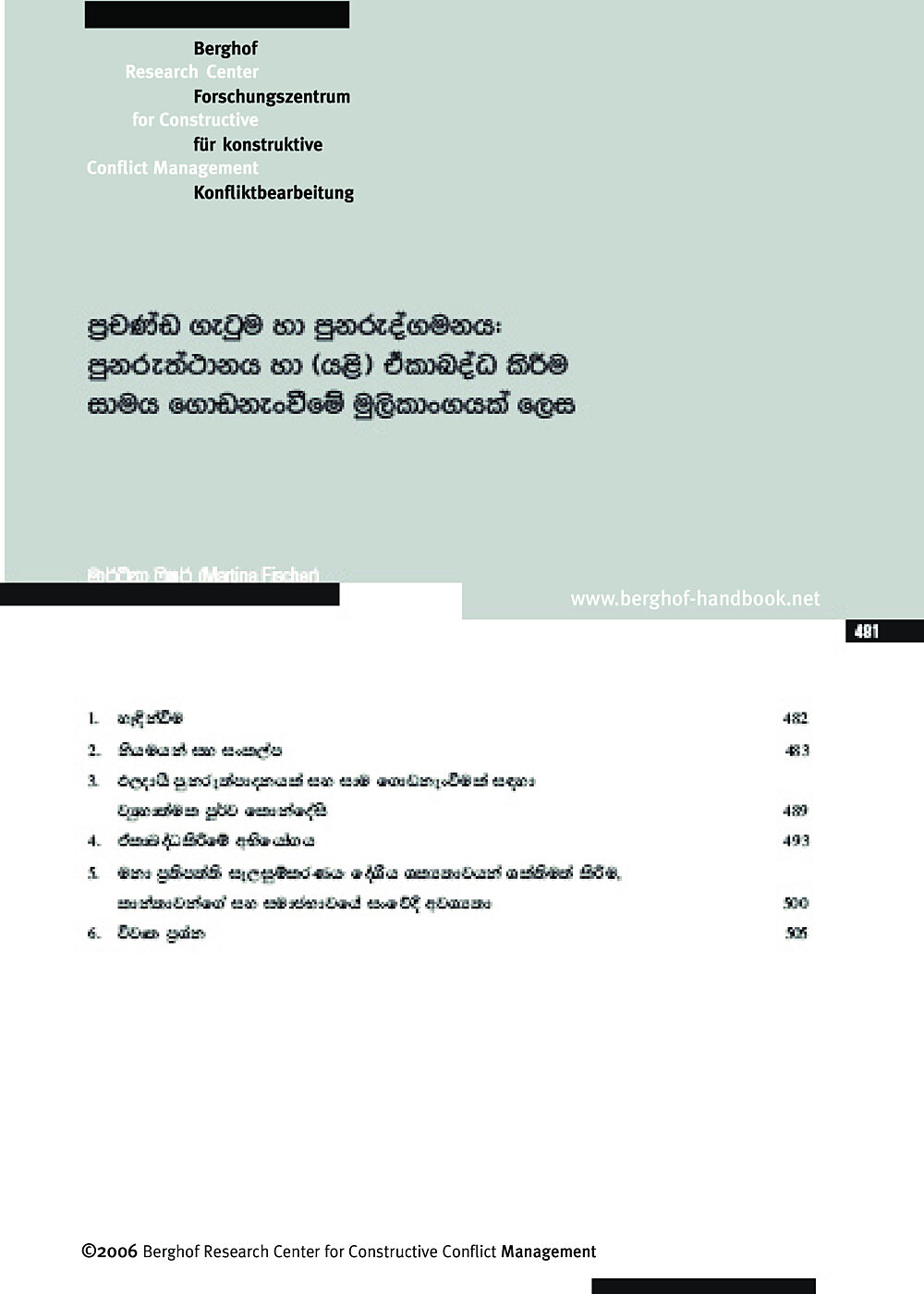
ප්රචණ්ඩ ගැටුම සහ පුනරුද්ගමනය: පුනරුත්ථාපනය හා (යළි) ඒකාබද්ධ කිරීම සාමය ගොඩනැංවීමේ මූලිකාංගයක් ලෙසHandbook Article
[සාරාංශ යන්ත්රයෙන් පරිවර්තනය කරන ලද] සරණාගතයින් සහ අවතැන්වූවන් නැවත ඒකාබද්ධ කිරීම ප්රධාන අභියෝගයක් වන අතර ගැටුම් පරිවර්තනය සඳහා පූර්ව කොන්දේසියකි. මෙම ක්රියාවලියේදී සිවිල් සමාජ සම්බන්ධතා, සාම අධ්යාපනය සහ සමාජ වැඩ සඳහා සංවර්ධනය, ආර්ථික ඉදිරිදර්ශනය සහ දේශීය ක්රියාකාරීන් සවිබල ගැන්වීම ඒකාබද්ධ කිරීමේ උත්සාහයන් අවශ්ය වේ. ක්රියාකාරකම් සම්බන්ධීකරණය ඉතා වැදගත් බව බෝල්කන් පාඩම් වලින් පැහැදිලි වේ. (2004 මුද්රණ සංස්කරණය සඳහා සංශෝධනය කරන ලදි)
- Year2007
- Author(s)Martina Fischer